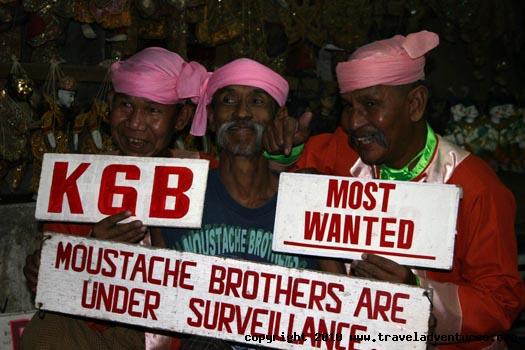
Moustache Brothers Lu Zaw, Lu Maw, Par Par Lay (left to right). Photo courtesy of www.traveladventures.org.
BY STEPHEN GRAY
Lu Maw is in pain. A toothache has robbed him of food, sleep and sanity; only a health professional can bring relief. Summoning the last of his strength he escapes across the Burmese border to Thailand, hoping that there he’ll find the treatment he desperately needs. Finally Lu Maw finds a clinic. The dentist is perplexed. “Why have you come this far?” he asks. “Surely they have dentists in Burma.” “Sure they do,” replies Lu Maw, his face stretching to a grin. “But in Burma we’re not allowed to open our mouths”.
The audience gathered in Lu Maw’s living room erupts into laughter. Relaxed, smiling and carefree, it’s hard to believe that he could be killed for telling these jokes in Burma. On this evening six or seven tourists line a bench seat meters from the small raised platform that serves as his stage. It’s a small group, but crammed as we are between the marionettes that line the walls and the larger than life presence bursting from the stage, it feels like the room is packed.
Lu Maw belongs to the Mustache Brothers, a comedy troupe that performs a blend of standup comedy and political satire for tourist audiences in Mandalay, Burma’s second city. With his brother Par Par Lay and cousin Lu Zaw, Lu Maw takes to the stage in an obscenely colorful silk costume adorned with small bells that jingle as he leaps around the stage. You’d be forgiven for thinking they were younger than their sixty odd years. Their wispy grey moustaches are so long that they appear to trail behind them as they move.
The performance this evening shifts between singing, slapstick skits and stand up comedy routines – each sprinkled with liberal doses of politics and a call for change. Such sentiment can easily lead to a lengthy prison in Burma, but the brothers have little fear about being provocative.
“You have no democracy in the United States,” says Lu Maw. The audience pauses, not sure whether to laugh. “You wait four years before electing a new president. Even Thailand is more democratic than you,” he continues. “They’ve had five new Prime Ministers in four years!”
Unfortunately for the Brothers their authoritarian leaders don’t share their sense of humor. For the past decade the group has been blacklisted by the ruling military regime – the State Peace and Development Council (SPDC) – because of their anti-government, pro-change message. After three generations of touring the country and performing on the stage, the family has had their license revoked and is now consigned to performing in their own home.
A powerful narrative of injustice drives the Mustache Brothers’ humor. “In every house there’s no light, no 24 hour electricity,” says Lu Maw. “There’s no education for the children. The country has many natural resources…gas, gemstones, teak wood, even opium. Where does all the money go?”
This is a country where there are no independent newspapers and even song lyrics must pass a censorship board. Those that do speak out can expect a violent backlash. During the 1988 and 2007 uprisings, the military junta has killed thousands of Burmese, including hundreds of the monks that lead the 2007 protests.
The Brothers have also paid their fair share of dues for speaking out. In 1996 the comedy troupe performed a show for 2000 guests in the grounds of democracy leader Aung San Suu Kyi’s home. On that occasion Lu Maw stayed home, “holding the fort…keeping the home fires burning” he says, proud of his idiomatic English. Par Par Lay joins us Lu Maw and I talk. He doesn’t speak English but seems to understand what we are talking about.
Two days after the show soldiers came and arrested Par Par Lay and Lu Zaw. “Trumped up charges” says Lu Maw. “I began to wonder who the real actors were” he adds, joking almost as if he wasn’t talking about a trial in which his relatives were tortured, sentenced and imprisoned before he could even say goodbye.
Par Par Lay’s eyes look to the floor as Lu Maw describes how Par Par Lay and Lu Zaw were forced to work in shackles and chains for twelve hours per day, digging up gemstones in the mines of Kachin State. Numb from a combination of exhaustion, disease and malnutrition, Lu Maw describes how one and two inmates died per week.
Despite the adversity, comedy lived on in prison for his brother and cousin. “They used to joke with the guards,” says Lu Maw. “How can we dig up lots of gemstones”, they would say, “if you only feed us dirty rice water?”
International pressure from United States and British comedians helped win their release after five years. It wasn’t long before they were spreading their message once more, albeit from the confines of their living room. Asked how they keep from getting caught, Lu Maw responds that they must know who is in their audience at all times. At the slightest hint that a potential informant is watching, the Mustache brothers drop the politics in favor of a politically-correct version of their show. So far it’s worked. Lu Maw later confesses that international attention also stops the authorities from locking them up again.
If it’s so risky why do they do it? “Tourists are our Trojan horse” explains Lu Maw. The tourists that visit Burma provide one of the few means of telling their story to the outside world. “We can’t fight the government by ourselves” Lu Maw pleads, a rare moment of solemnity crossing his face. “We need your help”.